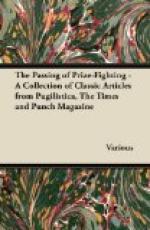When you hear the title or see the cover of The Heel of the Hun (HODDER AND STOUGHTON) your blood may begin to curdle and your flesh to creep. Be assured. When I think of some of the war-books vouchsafed to us Mr. J.P. WHITAKER’S is almost tame, and I venture to say that it might be read out loud at a party of sock-knitters without a stitch being dropped. Mr. WHITAKER was in Roubaix and, presumably because he was believed to be an American, was allowed considerable freedom. So, before he escaped into Holland, he saw some things which were not for British eyes, and he tells us about them with a staidness altogether unusual in this kind of book. Although he forgets to mention the fact, his articles have already appeared in The Times, and I can see no particular reason why they should have been gathered together in this brief volume. Anyhow, I must believe that the Hun’s heel fell less heavily on Mr. WHITAKER than upon most people who have had the misfortune to be introduced to it.
* * * * *
An author who can choose so fascinating a title as The Way of the Air (HEINEMANN) certainly has much in his favour, and this not only because of the more or less temporary connection between aeronautics and victory, but because just lately we have all been talking large and free about peace-time developments of the craft in the near future. Personally I have already arranged to take my wife’s mother for a short week-end in the Holy Land in the Spring of 1920; and a forty-eight hours’ mail service to Bombay is an event of to-morrow. Thus, if Mr. EDGAR C. MIDDLETON’S book fails to secure general appreciation, he must place the blame elsewhere than with his subject, and it is a fact that by some repetitions and contradictions, as well as by a tendency to let one down at what should be the critical point of his yarns, he has done something to alienate a public—such as myself—entirely predisposed in his favour. It remains to say, all the same, that this little volume is in the main a sincere and obviously well-informed account of the doings of the men of our air services, full of incident and achievement utterly beyond belief an unbelievably short time ago. In the pages he devotes to prophecy—an irresistible temptation—he is on controversial ground, and his apparent preference for the “gas-bag” as the principal craft of the future will certainly not find general acceptance. Much more to my liking is his suggestion that duck chasing and shooting from an aeroplane—it has already been done at least once—may become a recognised sport.
* * * * *
[Illustration: Barber. “MY TONIC ’AIR-RESTORER IS TO THE BALD ’EAD WHAT THE BENEFICENT SPRAY IS TO THE BLIGHTED TOOBER.”]



